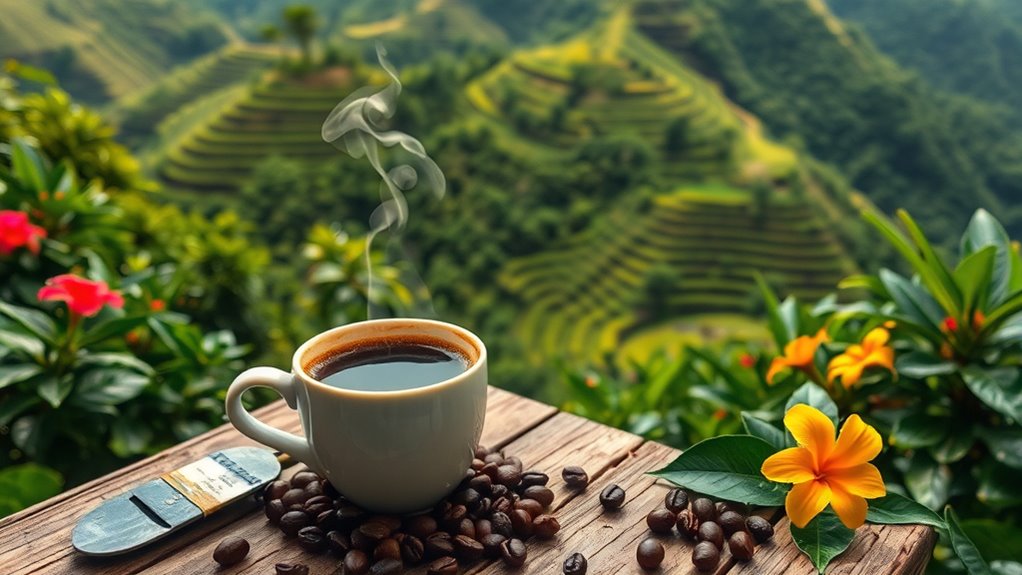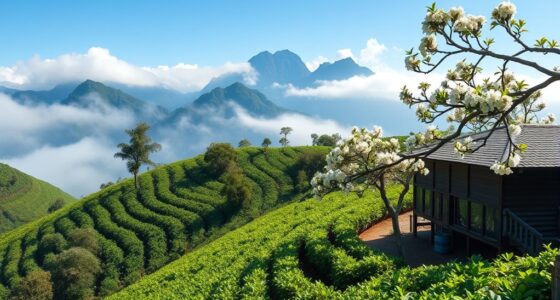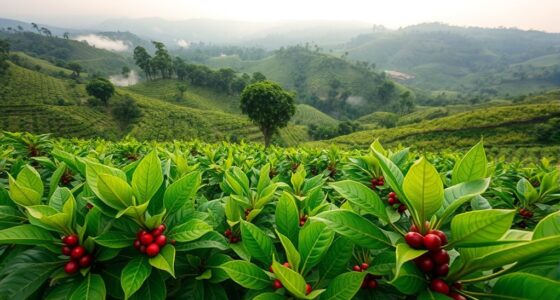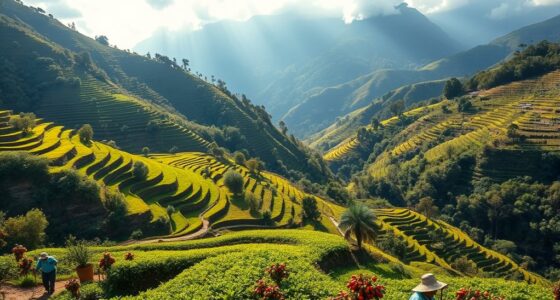Discover Indonesia’s rich coffee regions: Sumatra offers earthy, full-bodied beans from traditional small farms; Java provides balanced, mildly spiced flavors grown in volcanic soils; Bali boasts artisanal, specialty brews with complex profiles harvested organically; Sulawesi delivers deep, fruity, and spicy beans from diverse terrains. Each region’s unique climate and cultivation methods create distinct flavors worth exploring. Continuing this journey reveals more about Indonesia’s vibrant coffee heritage and the best ways to enjoy each variety.
Key Takeaways
- Sumatra offers earthy, full-bodied coffees like Mandheling, grown on small farms with traditional wet-hulling methods.
- Java features balanced, mild beans from volcanic soils, cultivated on larger plantations with sustainable practices.
- Bali specializes in organic, specialty coffees with complex flavors, often brewed using pour-over or AeroPress techniques.
- Sulawesi produces deep, fruity, and spicy coffees such as Toraja and Kalosi, reflecting diverse microclimates and processing methods.
- Regional differences in cultivation and brewing styles enrich the coffee experience across Indonesia’s diverse terroirs.
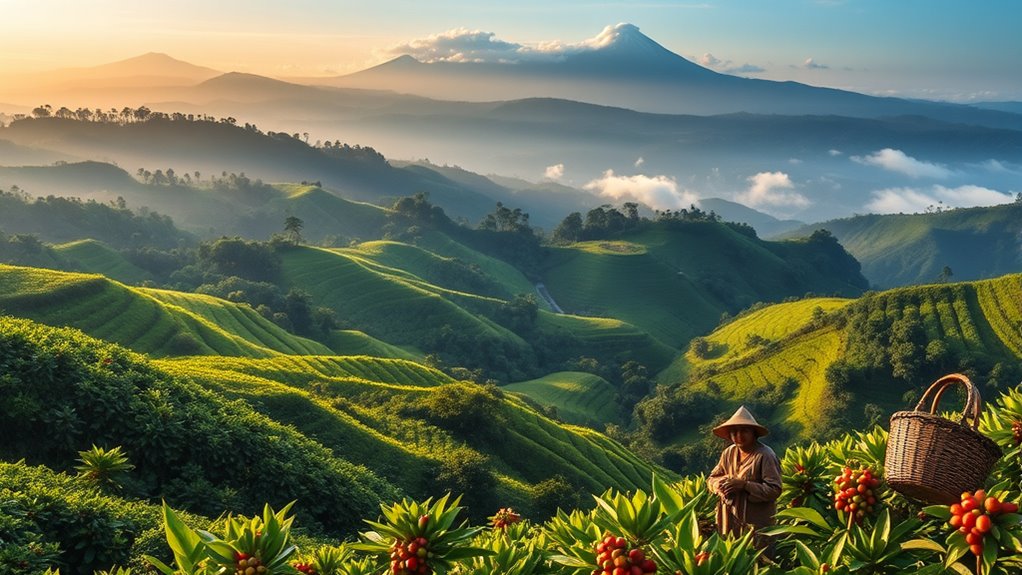
Are you curious about Indonesia’s rich coffee culture? If so, you’re in for a treat. Indonesia is renowned for its diverse coffee landscape, shaped by unique climates, terrains, and traditions. To truly appreciate this vibrant coffee scene, understanding how coffee cultivation varies across regions and exploring different coffee brewing techniques is essential. Each island offers distinct flavors and methods that reflect local customs and environmental conditions.
Discover Indonesia’s diverse coffee culture through regional flavors and traditional brewing methods.
As you explore Indonesia’s coffee, you’ll notice that coffee cultivation is deeply embedded in the local way of life. In Sumatra, for example, the rugged terrain and humid climate create ideal conditions for certain varieties like Mandheling and Lintong. These beans are often grown on smallholder farms, where traditional methods prevail. The process begins with careful selection and handpicking of ripe cherries, guaranteeing quality from the start. The beans then undergo specific processing methods, such as wet hulling, which imparts a unique earthy and full-bodied flavor characteristic of Sumatran coffee. Moving to Java, you’ll find a different approach. Java’s volcanic soil and cooler highlands produce beans like Java Arabica that are often cultivated on larger plantations. Coffee cultivation here involves a mix of traditional and modern techniques, with an emphasis on sustainability. Java coffee tends to have a balanced profile—mild, with hints of chocolate and spice—making it popular worldwide.
In Bali, the focus shifts toward artisanal coffee cultivation. Many small farmers grow specialty beans using organic practices, emphasizing quality over quantity. The volcanic soil lends a rich complexity to the beans, which are often processed using washed or honey methods. When it comes to brewing, Bali’s coffee enthusiasts favor techniques that enhance the beans’ natural flavors. Pour-over and AeroPress are popular choices, allowing for precise control over extraction and highlighting the coffee’s nuanced notes. Bali’s thriving coffee culture also reflects local traditions, which influence not only cultivation but also the social aspect of coffee drinking. Sulawesi, with its rugged terrain and diverse microclimates, produces distinctive beans like Toraja and Kalosi. These coffees are celebrated for their deep, complex profiles, often with fruity and spicy undertones. The processing methods, combined with careful harvesting, guarantee that these unique flavors are preserved.
As you sip your Indonesian coffee, consider experimenting with different brewing techniques. From French press to siphon, each method can reveal new layers of flavor, making your coffee experience even richer. Whether you’re exploring Sumatra’s earthy richness, Java’s balanced smoothness, Bali’s aromatic finesse, or Sulawesi’s complexity, understanding the nuances of coffee cultivation and brewing techniques will deepen your appreciation for Indonesia’s vibrant coffee heritage. So, take your time, savor each cup, and enjoy discovering the diverse world of Indonesian coffee.
Frequently Asked Questions
What Are the Best Brewing Methods for Indonesian Coffee?
You should try brewing Indonesian coffee with a French press or pour-over for the best flavor. The French press extracts rich, full-bodied notes, highlighting the coffee’s deep earthy tones. Pour-over, on the other hand, offers a clean, bright profile that emphasizes the coffee’s nuanced qualities. Both methods allow you to enjoy the complex, bold flavors typical of Indonesian beans, giving you a delightful, authentic coffee experience.
How Do Indonesian Coffee Flavors Vary by Region?
Did you know Indonesia produces over 660,000 tons of coffee annually? Regional flavor profiles vary greatly due to cultivation differences. Sumatra offers earthy, full-bodied coffees with herbal notes. Java’s beans tend to be bright and balanced with a hint of spice. Bali provides a sweeter, fruitier profile, while Sulawesi delivers rich, bold flavors with hints of cocoa. These variations make Indonesia’s coffee truly unique and diverse.
Are There Any Unique Coffee Customs or Traditions in Indonesia?
You’ll find that Indonesia has unique coffee customs, like participating in traditional brewing methods and coffee ceremonies. In regions like Sumatra and Java, locals often gather to enjoy coffee together, celebrating it with ceremonial rituals that honor their cultural heritage. These customs highlight the importance of coffee in social life, where preparing and sharing coffee becomes a meaningful tradition, fostering community and connection through these special practices.
Which Indonesian Coffee Farms Offer Tours for Visitors?
Did you know Indonesia produces over 660,000 tons of coffee annually? Many farms, like those in Sumatra and Bali, offer engaging coffee farm tours focused on sustainable farming practices. Visiting these farms gives you a chance to see how beans are cultivated, harvested, and processed, while supporting eco-friendly methods. You’ll get an authentic experience, learn about local traditions, and enjoy freshly brewed coffee straight from the source.
How Does Climate Change Impact Indonesian Coffee Production?
Climate change affects Indonesian coffee production by increasing unpredictable weather patterns and temperature rises, threatening crop yields. You can help improve climate resilience by supporting farms that diversify their crops, which reduces risk and sustains income during climate shifts. As a coffee lover, understanding these impacts encourages you to choose sustainably grown coffee, promoting practices that adapt to changing conditions and preserve Indonesia’s rich coffee heritage for future generations.
Conclusion
Now that you’ve explored Indonesia’s diverse coffee regions, you’re ready to savor its rich flavors. Did you know Indonesia ranks as the world’s fourth-largest coffee producer? From the bold, earthy Sumatran beans to the bright, fruity Java varieties, each region offers a unique experience. So, next time you brew your cup, remember the vibrant landscapes and passionate farmers behind every sip. Indonesia’s coffee culture truly is a journey worth tasting.
